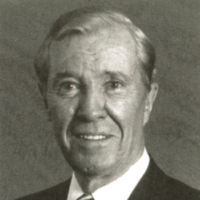
David Mahoney
Charles A. Dana Foundation and the Eleanor Naylor Dana Charitable Trust
For visionary leadership in educating the public and the donor community about the importance of brain research, and for directing funds for the support of neuroscience.
"Mahoney is the Mary Lasker of this generation," said Nobel Laureate James Watson, referring to the activist leadership Mrs. Lasker provided in the field of medical research. David Mahoney, as chairman and chief executive officer of the Charles A. Dana Foundation and the Eleanor and Naylor Dana Charitable Trust, is an incredible philanthropic activist. He is a unique foundation leader combining a lay knowledge of neuroscience with genius for marketing (gained from more than four decades as one of America's premier business leaders). With passionate commitment and indefatigable energy, Mr. Mahoney has inspired others to follow his foundation's lead in funding brain research through generous giving.
Mr. Mahoney had developed a growing interest in the study of the brain during his involvement as a founding trustee of the American Health Foundation and as chairman of the Phoenix House Foundation, a private, non-profit drug abuse agency. In 1983, he became a benefactor of neuroscience, contributing $1.7 million to fund the David Mahoney Institute of Neurological Sciences at the University of Pennsylvania. In 1990, he established the Harvard Mahoney Neuroscience Institute at Harvard Medical School. In 1999, Columbia University honored his many contributions to medical research with the creation of the David Mahoney Center for Brain and Behavior Research.
Since 1977, as chairman of the Board of the Dana Foundation, Mr. Mahoney has had substantial influence on the progress of brain research. Under his leadership, the Foundation has committed more than $34 million in grants for brain research. In 1992, after President Bush declared the 1990s to be the Decade of the Brain, Mr. Mahoney challenged the neuroscience community to publicly declare the scientific accomplishments that could be reached by the end of the decade. He then provided the resources to help the neuroscience community educate the public about the promise of brain research. He was directly responsible for founding, in 1992, the Dana Alliance for Brain Initiatives, a non-profit organization of more than 185 neuroscientists committed to advancing public understanding of the progress and promise of brain research. In 1995, he created the concept of Brain Awareness Week, bringing neuroscientists, government agencies, and patient advocacy groups together to illustrate the advances of brain research to the public. In 1997, the European Dana Alliance for the Brain was launched with a similar commitment and a membership of 67 European neuroscientists. Currently, Brain Awareness Week is observed by 850 partner organizations in 27 countries. In 1998, with the establishment of the Dana Brain-Body Institute, Mr. Mahoney turned the Foundation's attention to the relationship between the brain and the three leading killers in the United States: cancer, stroke and heart disease, supporting research on the interrelationship between the brain and these terrible diseases.
Mr. Mahoney has had a lifelong commitment to health and medical research. As a benefactor and leader of a major philanthropy, he has not only continually challenged the science community to conquer brain-related disabilities and diseases, but he has dedicated philanthropy to support research. Mr. Mahoney's determination and generosity have made if possible to learn more about the brain in the last ten years than in all previous history.
